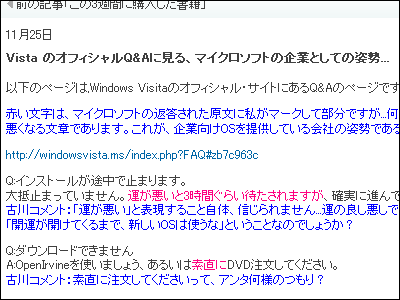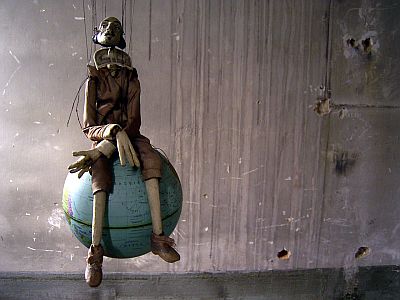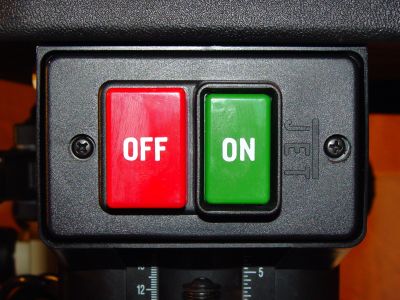The free encyclopedia "Wikipedia" birth anniversary story

On Wednesday, January 15th 2007, Wikipedia (Wikipedia) celebrated its 6th anniversary.
However, it is not well known that there was "Nupedia" (Nupedia) before this Wikipedia. Nupedia was started in March 2000. Unlike the current Wikipedia, I was aiming for a free encyclopedia based on an expert (basically it is necessary to have a doctor's degree), but almost no article was posted, and in September 2003 I am stopped. There were only 24 articles published from March 2000 until September 2003. Because the peer-review system by experts was very severe and it took seven steps. I can understand exactly how Wikipedia who did not have that kind of thing was excellent.
But, in fact, what kind of circumstances did Wikipedia have become like this now? And what is the real reason why Wikipedia has become superior so far? Let's see the circumstances of that in order.
Nupedia - Wikipedia
http://ja.wikipedia.org/wiki/Nupedia
A more detailed historical document on Nupedia is stored in the following Wikipedia.
Wikipedia: Nupedia and Wikipedia - Wikipedia
In the above article, the content written after "It is only Japanese version" is quite persuasive. Originally Wikipedia, unlike Nupedia, was launched as a project to recruit "no big deal" from the public, but because of its openness it is as good as any other open source project like Linux As a result, the Wikipedia person succeeded and the Nupedia person closed down.
At first, Nupedia has a successor project, but ... There is something like the following.
Nupedia, the free encyclopedia
http://nunupedia.sourceforge.net/
However, here is the essence of Nupedia's original thought itself.
In other words, in essence, the fact that it was aimed at "a system that allows selected people to post and edit articles freely". Well, when explaining Wikipedia sometimes well, we express expressions like "Anyone can freely post and edit," but this is not that "anything can be written".
So, what is good about Wikipedia, the passage of the following article shows it very accurately.
Think Wikipedia as a merchant - Serial Innovation [ITmedia Alternative · Blog]
Mr. duke says, "It is very interesting that Wikipedia's true strength is in the point that" the parties are writing articles "is pointed out."
However, as I am, I would like to expand a little more and think about it. That is, "There is a considerable area of expertise for everyone, we are willing to write free of charge to Wikipedia about that area, and as a result of these writers gathering, a hard-working collision mechanism on the accuracy of description works , And that mechanism is going to refine the description semipermanently ".
Even for fields that are not parties, there should be some people who are "fairly detailed", and if such a person makes a "somewhat" accurate description, that "some extent" is modified by another writer, "unlimited" accurate It goes closer to the description. I think that it is amazing to have such an aggregation mechanism of knowledge.
Although there is "a friendly competition mechanism on the accuracy of description", a big misunderstanding in general is that editing by this friendly competition is never done by "users who do not know anyone anonymously". In most cases, some registered users are refining the original coarse articles. And, if the polished article is altered by the so-called "vandalism" and it gets messed up, the "manager" will go out.
Most of the vandalism tends to use Wikipedia for "certain assertions", but Wikipedia is not an argument place, it is an "encyclopedia" to the last. However, it is human being to post and edit human beings. It is natural that disputes and controversies always arise there if there are people and people. This is a Wikipedia that leaders can not see from the table, but there is a guideline for when such a problem occurs once.
Wikipedia Japanese version Administrator Interview: Hotwired
The item "neutral point of view" is well done. It is a core concept that there is no other policy. So, when something happens, "Please refer here."
The following is the item "neutral point of view". It is tremendous volume but it is worth reading. It is not an overstatement to say that this is the fundamental idea that makes Wikipedia as Wikipedia.
Wikipedia: Neutral Point of View - Wikipedia
It is the part of "criticism and answer" that you can easily understand that you are reading and being polished in historical circumstances, "By the way this policy was originally created for a Noupedia by a philosopher There is only a philosopher thinking about its base as it says.
There is a decisive difference with respect to maintaining the quality of the original English Wikipedia and the Japanese version of Wikipedia, and there is a need to pay attention to this point. The following are the points that are generally presumed to be the fundamental cause. First of all in English version.
Wikipedia is really "open source" - CNET Japan
In fact, many contributors reveal their identities when posting, but there are also few people who do not express themselves.
Does it only make you cry late? - Wikipedia's disappointing issue of riots casts - CNET Japan
On Wednesday, Wikipedia announced that it will not allow posting of articles by unregistered users. Since members of Wikipedia present some personal information at the time of registration, it is the logic that we will bear more responsibility for the content of articles I have written.
On the other hand, the Japanese version is as follows.
Wikipedia Japanese version Administrator Interview: Hotwired
Q: Are there other features of the Japanese version?
The impact of Imaizumi 2 Channel is very big. The user does not try to register. It is a user who has not registered for over 60%. Other languages are less than 30%. I am also looking at the English version, so it's a little strange as I compare them.
Iwase user registration, even though it does not change to anonymity, you probably do not want to give your name on yourself.
In response to this situation, something like the following was written in some cases.
Ikeda Nobuo blog 2 Wandering into a channel Wikipedia
It seems that the reason why the quality of Wikipedia Japanese version is poor is that the fact that anonymity is common on the web is affected. According to Akihiro Uda, 80% of American blogs are real names, but 90% of Japan is said to be anonymous. The cause of this strong anonymity in Japan is probably because you are afraid that "reputation" will be hurt, such as being caught by the company when he speaks in real names, or being caught by friends.
However, in fact you are using Wikipedia, and it seems probable that the majority of people probably did not feel that quality was bad to the extreme. (However, there are many cases when there is no item of matters you want to check in the first place). Why is the encyclopedia which should be written by experts such as Nupedia originally originated if it is originally maintained a quality of this quality (meaning the quality of this degree to the last) with a set of amateurs? It is thought that the following points are very accurate with regard to this point.
Rauru Blog >> Blog Archive >> Wikipedia strengths and weaknesses
Yes, the true strength of Wikipedia is that it is "the parties are writing articles".
Journalists are interviewees at all times, they can not be parties. It is obvious that the parties can grasp accurate information at the earliest. Actually it does not matter much about collective intelligence. However, the current Wikipedia system is suitable for gathering the parties widely.
On the contrary, this also becomes a weakness of Wikipedia. You can not demonstrate your strength without a party. It is impossible for a non-party person to work for one person to gather 1 million people. For example, the following story appears in articles written by mara in the past.
* At Wikipedia, there were more articles for Middle-earth in Tolkien than articles on African countries until a while ago
* The information on the Dominion war of Deep Space Nine was more detailed than the information on the Congo war
In other words, in the initial Wikipedia, there were few parties on the Africa problem, but the overwhelming number of parties as Ring Mania and Star Trek Mania was overwhelmingly that the information in the article was biased toward that . Currently I heard that this problem is heading for remediation considerably, but it is a story in the English version, the amount of information is much more biased in the comic / animation / game / Internet field in the Japanese version Wikipedia.
In other words, Wikipedia is "a system that collects expertise efficiently" rather than "an example of collective intelligence".
Since it is a system, there is also an administrator, and editing from most anonymous users, adding articles from registered users, or managing vandalism is done. It is almost as if in the general mass media coverage Wikipedia does not have an administrator, self-purifying action works, like crystals of collective intelligence gathered by everyone's good intentions, but the fundamental part of it is Nupedia That is why it has not changed much.
Let's see how Wikipedia management actually is done next.
· Next article
Behind the scenes of Wikipedia "Wikipedia administrator"?
Related Posts:
in Note, Web Service, Column, Posted by darkhorse







